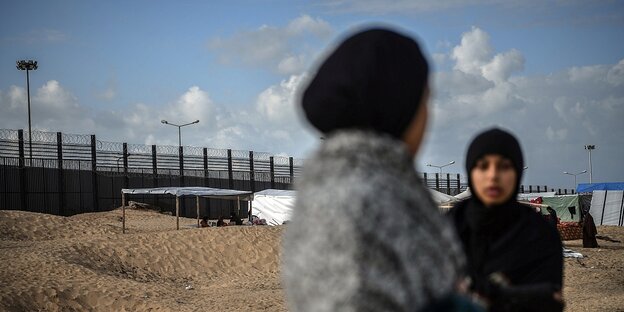Israel, the United States and Qatar are negotiating a Middle East ceasefire in Egypt. The goal of Israel's war remains the destruction of Hamas.

As the United States and Qatar continue to negotiate a ceasefire, Israel plans to forcibly relocate Palestinians from Rafah. Photo: Abed Zagout/Anadolu Agency/Picture Alliance
Negotiations for a ceasefire in the Gaza Strip and the release of Israeli hostages are a matter for the secret services. On Tuesday, the heads of the US CIA, the Israeli foreign intelligence service Mossad, the Israeli domestic intelligence service Shin Bet and mediators from Qatar met in Cairo. Its objective is to take a decisive step in negotiations for a ceasefire, the release of Israeli hostages and their exchange with Palestinians in Israeli prisons.
According to Egyptian government sources, negotiators have made “relatively significant” progress in negotiating a ceasefire between Israel and the Islamist militant Hamas. At the time of going to press, no further details were known.
The initial situation: Israel offers a six-week ceasefire for the release of all hostages, as announced by US President Joe Biden on the eve of the negotiations in Cairo, at a press conference in Washington after a meeting with King Abdullah of Jordan. There are still around 130 kidnapped in Gaza.
Hamas's initial reaction was clear: Osama Hamdan, Hamas's highest official in Lebanon, went to the press in Beirut almost simultaneously and declared that this was less than the lowest common denominator agreed upon in intelligence talks in Paris on the 5th. of February. Hamas wants to release the hostages in three phases within 45 days after the ceasefire. Only when it is guaranteed after the first phase that the Gaza war is over will the last hostages, the Israeli military personnel, be released. However, Hamas has indicated that it could be flexible on the number and names of Palestinian prisoners to be exchanged. Both Egypt and Qatar have pressured Hamas to make more concessions.
The sticking point remains: the Islamist terrorist organization wants the end of the war as a prerequisite for the release of all hostages. Israeli Prime Minister Benjamin Netanyahu has made it clear that at this point he would consider this a defeat. He still raises the destruction of Hamas as the main goal of the war.
Egypt fears mass exodus from Gaza Strip to northern Sinai
The negotiations are taking place under the Israeli threat of a military offensive in Rafah. Israel wants to put more pressure on Hamas in the negotiations. For his part, he has announced that the negotiations on the release of the hostages would be null and void with an Israeli military offensive in Rafah, to light more fire in the negotiating cauldron.
Egypt fears a mass exodus from Gaza to northern Sinai if the Rafah offensive takes place. Cairo does not see this only as a security problem. The Egyptian government fears becoming part of a Palestinian displacement scenario. It is questionable whether there will be anything left of Gaza after the war that Palestinians can return to. It is equally questionable whether Israel will once again leave the Palestinians behind. Parts of Netanyahu's right-wing government coalition are openly promoting a final expulsion of Palestinians from the Gaza Strip.
Reports circulated over the weekend that Egypt could suspend the Camp David peace treaty with Israel in the event of an offensive on Rafah. With the Camp David Accords, Egypt was the first Arab state to recognize Israel and made peace in 1979. Its suspension would be a serious blow to Israel's security. Ending the Camp David Accords would also put pressure on Jordan, the second Arab country to sign a peace treaty with Israel in 1994.
Egyptian Foreign Minister Samih Shukri has since publicly denied the rumors that came from diplomatic circles. However, Egyptian diplomats point out that an Israeli offensive in Rafah could violate the Camp David Treaty. There is also a demilitarized buffer zone between the Gaza Strip and Egypt, the so-called Philadelphia Passage. Only a limited military presence is allowed there from both sides, that is, Egypt and Israel. Heavy weapons are prohibited.
To prevent an exodus to Egypt, the United States is pressuring Netanyahu to, in a Rafah offensive, open an exit for the trapped Palestinians through a corridor to the north, that is, in the direction of the Israeli army coming from there. The problem here is that large areas of the northern Gaza Strip are completely destroyed, with no water, no electricity and insufficient food. People would literally face the ruins of their previous lives without being cared for.
Alternatively, report this Wall Street Journal of an Israeli proposal that Egypt could establish 15 camps with 25,000 tents in the southwestern part of the Gaza Strip, financed by the United States and the Gulf States. The newspaper is based on Egyptian sources. Even if this plan comes to fruition, it would pose a huge logistical challenge and take time to implement. Rafah has swelled to five times its original population due to internally displaced people hoping to find safety there in the southern corner of the Gaza Strip. An estimated 1.4 million people live there in desperate conditions: this corresponds to the population of Munich.
The Israeli government is said to have asked UN agencies operating in the region to help evacuate civilians from Rafah. He considers Rafah the last bastion of the Islamist group Hamas, which it wants to destroy during the Gaza war.
But the United Nations does not want to be involved in the forcible removal of Palestinians from the southern Gaza Strip city of Rafah, according to the UN emergency relief office, Ocha. “The Israeli government has not told us about such plans,” Ocha spokesman Jens Laerke told the German Press Agency in Geneva. “In any case, we will not participate in plans to forcibly relocate people,” Laerke said. “Nor would we provide tent cities elsewhere for Israeli forces to forcibly relocate people.”